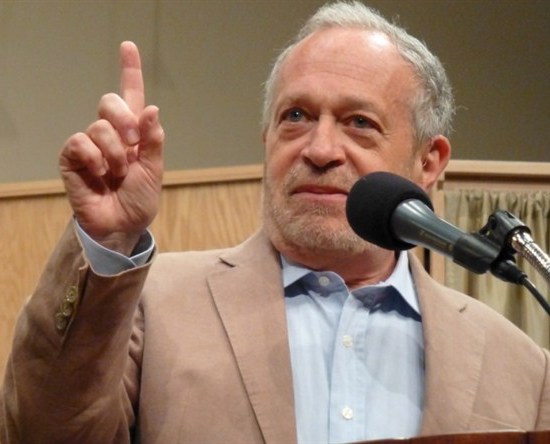20th Maurice Galante Lecture: Robert Reich Cites Political Malaise as Threat to Democracy at Maurice Galante Lecture

Professor Robert Reich believes that the greatest current threat to our democracy is not our president, not congressmen, and not the bureaucracy of our political system. It is that Americans have lost faith in the strength of their country’s democratic institutions.
UCSF held its 20th annual Maurice Galante lecture at Genentech Hall on Thursday, April 27 in honor of its namesake, a late renowned professor of surgery. Past guest speakers for the Galante lecture have included popular figures such as Malcolm Gladwell, author of The Tipping Point, and Neal Benezra, the director of SFMOMA.
Reich, currently a Professor of Public Policy at UC Berkeley, delivering a seminar entitled ‘“The Present Threat to Democracy.”’
Reich is an especially timely guest for our uncertain political future. He has served as advisor to two presidential administrations and is a prominent thinker on the socioeconomics of our current society. His bestselling books, including The Work of Nations, have for decades investigated the issues of labor and the widening income gap generated by national economic and political trends.
Reich’s lecture was an accessible yet informative walk through modern American history, weaving the events of the past 40 years into a storyline intending to answer the question, “How did we get to where we are now?”
Reich repeatedly emphasized that his seminar was not intended to be all about President Trump. As much as Trump looms over any political discussion today, said Reich, he is merely a symptom of a deeper problem in American society. The goal of this lecture was instead about the national project of “strengthening our democratic institutions.”
Reich began his story in 1963, the tail end of the baby boomer years. Many Americans believe that this was when the nation was at its “greatest.” Hillary Clinton, Donald Trump, and Reich himself are among those born in the boomer era. At the time, said Reich, 62% of Americans said they “trust government to make the right decision most of the time.” How many agree with this statement today? Just 3%.
This is the central difference in the relationship between Americans and their government now compared to 50 years ago, and the root of much of our current political strain. What changed?
Reich provided his theory: From 1945 until the late 1970s, the economy grew consistently every year and Americans across socioeconomic classes reaped the benefits. From 1979 until 2008 we experienced a slowdown and eventual stagnation, and what little growth did occur was distributed mostly amongst the wealthy, leading to gradually increasing social tensions.
The reason we didn’t see these tensions surface until much later, Reich explains, is that Americans were able for decades to alleviate their economic stresses in three ways. First, women poured into the workforce during this time, leading more and more families to become two-income households.
These women and men in the workforce also began to work increasingly longer hours to stay afloat. Finally, and most recognizable to those familiar with the causes of the Great Recession, people used their real estate as “piggy banks” of equity.
Of course, this all culminated in the financial crisis of 2008 and the socioeconomic class struggles that emerged onto the forefront of political discourse in the years since.
Only at this point does Reich bring up Donald Trump, who for many was a loudspeaker for their frustration. But the problem isn’t the man himself. Trump has taken advantage of the populace’s cynicism and distrust in government institutions, but if it hadn’t been him, it would’ve been someone else. Again, Reich emphasizes “we do not need to rail on Donald Trump.” Instead he stresses, “we need a different economy and different politics.”
It is easy to see why Reich has a nationwide reputation. He is a powerful, inspiring speaker, deftly lacing his stark calls to action with a buoyant tinge of humor: “I am not” he emphasized, “a class warrior. I am a class worrier.” This worry was infectious— though tempered with healthy optimism— and incited an urge for action in the audience.
Reich’s advice for tackling this problem? Participate in grassroots and local government organizations. We each need to do our own part working to rebuild the national faith in our democratic institutions. Cynicism and further distrust in the system only feeds into the forces that got us here in the first place.
This article orginally appeared in Synapse, the student newspaper of UCSF, and is reprinted here with their gracious permission. The author, Nicholas Gentry, is a first year Biomedical Sciences graduate student at UCSF.
